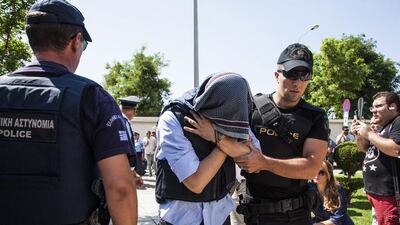ISTANBUL // Turkish president Recip Tayyip Erdogan has declared a three-month state of emergency throughout the country, following a failed military coup last Friday.
The move will allow the Turkish cabinet to rule by decree, bypassing parliament. The government claims the measures will enable them to restore order and target those responsible for the attempted coup.
“The state of emergency gives [the authorities] a [broader] legal framework to suspend key human rights areas,” said Ziya Meral, resident fellow at the Centre for Historical Analysis and Conflict Research.
The state of emergency could enable the restriction of movement, and the imposition of curfews. It could lead to limits on publishing, free expression, and public gatherings and protest, and can make it easier to shut down associations for up to three months. Detentions can be extended beyond the 48 hours currently prescribed under law. Governors are set to have an elevated role over local security forces under the measures. Police stop and search powers could be extended. People will be obliged to carry their identity cards with them.
The state of emergency can be applied throughout the country or in certain regions for up to six months.
Parliament approved the state of emergency of emergency by a vote of 356-115 on Thursday. It also has the power to overturn emergency decrees.
Deputy prime minister Numan Kurtulmus said the European Convention on Human Rights would be suspended for at least a month.
The government insists that civil rights and freedoms will not be unduly affected, and highlighted that European countries such as France and Belgium have taken similar measures to combat terrorism.
“The aim of the declaration of the state of emergency is to be able to take fast and effective steps against this threat against democracy, the rule of law and rights and freedoms of our citizens,” Mr Erdogan said on Wednesday night. His AK party (AKP) blames the Gulen movement and its supporters for being behind the coup, although many analysts have expressed scepticism and the movement’s leader, the US-based cleric Fethullah Gulen, has denied the allegations.
Ali Beker, 33, an online journalist, is a staunch secularist and supporter of the left-wing HDP. He opposed the coup but has mixed feelings about the aftermath. “I hope the state of emergency is sincere and gets rid of [the Gulen movement]” he said. “I’m just worried that Erdogan and the AKP might use the failed coup to get absolute power and take over the state.”
Mr Erdogan and the AKP government have been accused by many of growing authoritarianism over the past few years, including by banning and breaking up anti-government protests and targeting opposition media.
In the wake of the coup attempt more than 60,000 military personnel, civil servants, teachers, policemen, prosecutors, judges and academics have been detained, suspended or sacked.
Ibrahim Haluk Eren; 33, is a supporter of the AKP and backs the emergency measures, believing it will not affect the rights of ordinary citizens. “I believe it has nothing to do with civilians nor to do with the daily life; it is something against those who threaten our nation; the Gulenists. Above all; it is all legal and within our constitution.”
Mr Meral says the state of emergency is not an issue per se as the government faces a real threat, but the question is how these powers are wielded. “There are concerns that this wide purge that we see is too high in number,” he said. “[Some] see the government as seizing an opportunity to pretty much do away with anyone in the state structures who might not be with them.”
More than 200 people were killed during the attempted coup. The government was able to marshal loyalist military forces, and president Erdogan evaded capture – calling on supporters to flood the streets and face down the rebel military. It worked, and largely pro-Erdogan and pro-AKP supporters have continued to take to the streets each night in major cities chanting Mr Erdogan’s name, waving Turkish flags, and hanging out of cars honking and celebrating late into the night.
Mr Eren joined the protests in his neighbourhood but despite Mr Erdogan urging people to keep going out into the streets, he says he intends to stop now as he believes the situation is under control.
For others, the continuing street rallies now make them uncomfortable. “More than 200 people died and they are celebrating. We should be mourning,” said Mr Beker. As a secularist he finds some of the religious chanting of the protesters “disturbing”.
This is not the first state of emergency imposed in Turkey. There have been several over the years in one locality or another, mostly because of the activities of the Kurdish insurgent group, the PKK. But it is the first time that a nationwide state of emergency has been declared under the AKP, which has held power since 2002.
“Every crisis is a political opportunity,” said Mr Meral, “and how [the government] handle this is actually more important than the act itself.”
foreign.desk@thenational.ae

